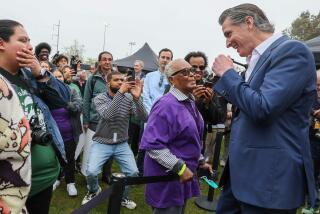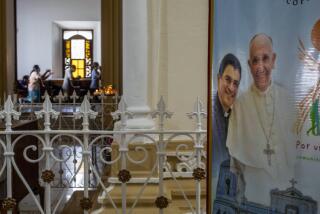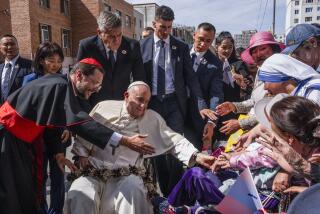Papal Visit Fuels Hopes That Cuba Trip Results Will Rub Off
LAGOS, Nigeria — As Pope John Paul II begins a three-day visit to Nigeria today, many in this populous West African nation are banking on him to work a few miracles.
Members of the Roman Catholic clergy are counting on the pontiff to help forge reconciliation among Nigeria’s opposing groups, religious and political, and leaders of the country’s political opposition and human rights groups hope that the papal visit will lead to the release of scores of imprisoned dissidents, journalists, academics and activists.
Many Nigerians, however, remain only cautiously optimistic, convinced that the only person who stands to gain from the pope’s trip is Gen. Sani Abacha, the country’s military dictator.
The pope, on his second visit to this oil-rich nation of more than 100 million people, is scheduled to meet with Abacha tonight in the capital, Abuja. On Sunday, John Paul will head to the city of Onitsha to beatify Father Cyprian Michael Iwene Tansi, a priest who died almost 34 years ago.
Skeptics argue that Abacha, a Muslim--in a country where Islam is the faith of half the people--is unlikely to heed the words of the Catholic Church’s leader.
*
But religious leaders point to the pope’s visit to Cuba in January. After that trip, President Fidel Castro, a Communist, ordered the release of more than 200 prisoners, including some political detainees.
“If a person like Fidel Castro . . . can take off his military uniform for the pope and listen to the pope, then it would be a tragedy if this government does not recognize the opportunity of the visit of someone like the pope,” said Father Matthew Hasan Kukah, secretary-general of the Catholic Secretariat of Nigeria. “I don’t imagine that this government can afford not to listen to the pope.”
But Olawale Fapohunda, a representative of the Lagos-based Civil Liberties Organization, has doubts about the outcome. “The expectation among the human rights community is that the visit will lead to the release of many of our people, but I’m not sure,” Fapohunda said. “The government has shown that it doesn’t care.”
Arbitrary detentions, torture, summary executions, censorship and the basic denial of the rights of Nigerians to choose their own government have been the norm under Abacha since he seized power in 1993, activists say.
“The human rights situation has gone from bad to worse,” said Segun Jegede of the Committee for the Defense of Human Rights in Lagos. “The government is not a legitimate government. Any vocal opposition is a threat to the existence of such a regime.”
Susan E. Rice, U.S. assistant secretary of State for African affairs, recently branded Nigeria “one of the worst abusers of human rights on the continent.”
Pressure from the Vatican was key to persuading Abacha to commute death sentences in a 1995 coup plot. But soon after, famed writer and activist Ken Saro-Wiwa and eight others in another high-profile case were hanged despite worldwide pleas for clemency.
Abacha announced late last year that the government would release certain political prisoners, but none have been freed. The government has cited threats to national security as the reason for the delay.
Religious leaders are urging Abacha to seize the papal visit as a chance to publicly restate his commitment to democracy.
“We have squandered a lot of opportunities over the years. Our military must realize that this [visit] is the best opportunity we can have,” said Kukah, the priest.
More to Read
Sign up for Essential California
The most important California stories and recommendations in your inbox every morning.
You may occasionally receive promotional content from the Los Angeles Times.











